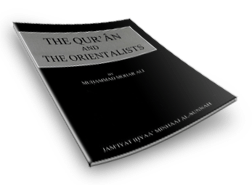The Qur'an and the Orientalists

In the Name of Allâh, the Most Beneficent, the Most Merciful
The author has met the orientalists on their own grounds. He has taken up their arguments and assumptions one by one, dealing with each and every one and examining them with the facts and logic.
The Qur’an and the Orientalists takes in to account the views and assumptions advanced about the Qur’an by the doyens of the orientalists of the nineteenth and twentieth centuries like William Muir, Theodor Noldeke, David Margoliouth, Arthur Jeffery, Richard Bell, Montgomery Watt, and others. These views are analyzed and discussed in three broad parts. In the first part are discussed those that constitute a direct allegation of the Prophet’s authorship of the Qur’an, particularly, his alleged borrowing from Judaeo-Christian sources, the question of his literacy and the alleged environmental influence on him in general.
In the second part are dealt with those that revolve around the question of the Qur’anic wahy and are aimed at showing that the Qur’anic revelation proceeded in some form or other from the mind and personality of the Prophet, thus supplementing the allegation of his authorship.
In the third part it is discussed those that relate to the history and text of the Qur’an, particularly Noldeke’s theory about the history of the text of the Qur’an, Arthur Jeffery’s “Materials” for the history of the text of the Qur’an, the Bell-Watt theory of revision of the text of the Qur’an, the fiction of the foreign vocabulary of the Qur’an, J.A. Bellamy’s supposed copyist’s errors and proposed emendations of the Qur’an and the like, together with a survey of the orientalists’ translations of the Qur’an.
The author has met the orientalists on their own grounds. He has taken up their arguments and assumptions one by one, dealing with each and every one and examining them with the facts and logic. It has been demonstrated how and where they have erred and drawn wrong conclusions. It has also been shown that in advancing their theories and assumptions they have in almost all cases distorted and misinterpreted the texts and the facts, often resorting to tendential shaping of the latter and a good deal of arbitrary assumptions and surmises. The treatment is clear, concise, to the point, logical, and effective.
The book is destined to set a new pattern of thinking about the orientalist writings on the Qur’an in particular and on Islam and its Prophet in general.





